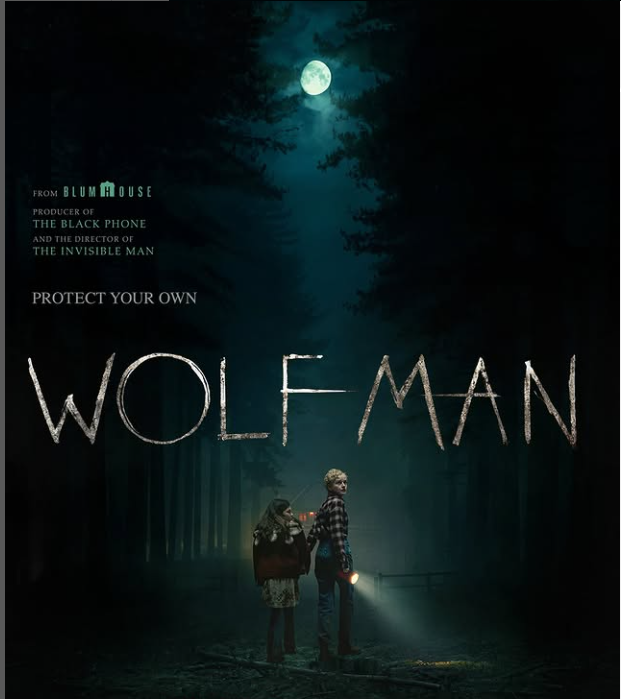
Film Critic Ryan Massey finds Wolf Man’s director Leigh Whannell straying from his cyber-horror roots with mixed results
On 16 January, I was lucky to be invited by Universal Pictures UK to the multimedia screening of Leigh Whannell’s remake of Wolf Man in Regent Street Cinema. While I was intrigued by the fact that Whannell’s name was attached to the project, I left the auditorium feeling underwhelmed.
Wolf Man centres on the Lovell family – Blake (Christopher Abbott), Charlotte (Julia Garner), and Ginger (Matilda Firth) – who inherit Blake’s father’s woodland retreat after he dies. However, they soon discover a human-wolf hybrid living in the trees.
The original Wolf Man was released in 1941 as a Gothic horror film, written by CurtSiodmak, in the era of the classic Universal Monsters movies. Leigh Whannell’s previous projects, Upgrade (2018) and The Invisible Man (2020), include his signature modern relevancy, using classic ideas but involving more technological and futuristic elements. However, compared to both this film Upgrade, Wolf Man is certainly more traditional and standard horror-thriller, with some admittedly fantastically executed body horror and sound design woven in.
The positives of this film, therefore, lie in its supposed purpose. The relatively modern refresh of this quite standard plot does offer some gruesome special effects, especially during the second act. The claustrophobic nature of the film too, taking place almost entirely in the restrictive grounds of the woodland cabin, and in the dark increases the suspense and invokes a sense of claustrophobia, which for me personally is one of the most effective triggers of horror. The woodland-based colour
palette on display throughout the movie is particularly consistent, and, in my opinion, embodies the classic Gothic trope of the unsafe abode, naturalising the inside of the house almost as an extension of its outside setting.
Additionally, the cinematography is fast paced and utilises Whannell’s signature tilting camera set-up on various occasions. Whannell’s strengths shine through in his deft focus on characters and metaphorical storytelling, which is emphasised through his camera work. Just like Cecilia Kass in The Invisible Man, the decay of the Lovells’ mental states is accentuated through the skittish and sometimes incomplete framing of some shots – teasing the shadowy appearance of the titular character – and the frequent close-up shots of the actors’ faces. It makes for a slower film in all, but as mentioned, the suspense is pulled off well.
“I failed to identify the fun and pace with which he tackled his preceding projects
On the flipside, despite Whannell having said multiple times in interviews that this film had been a passion project of his, I failed to identify the fun and pace with which he tackled his preceding projects. In the context of his previous works and projects he has worked on, namely acting and writing in the Saw (2004-present) franchise, and the fact that The Invisible Man is one of the most acclaimed horror films of this decade, Wolf Man does not nearly reach the dramatic highs and adrenaline-inducing fun of his other work. As the adage dictates, “hindsight is 20/20”, but the film in its
entirety is neither outstanding nor remarkable in its innovation and therefore is inherently removed in spirit from the quality of Whannell’s previous, innovative material.
Parallel to the uninventive sentiment of the film and its premise, the acting is similarly ordinary for the most part, and the writing is surprisingly shallow. While Julia Garner – having also just been cast as the Silver Surfer in The Fantastic Four: First Steps (2025) – is the stand-out here, deftly portraying a state of anxiety and unease, there is an underlying monotony in her performance, which sees her fall into the trap of becoming an uninspiring and plot-armoured protagonist, due to the generic writing. I
can appreciate that Whannell is sticking to the source material, however, unlike someone like Christopher Nolan, who in recent years has put his own unique spin on historical moments in Dunkirk (2017) and Oppenheimer (2023), it seemed to me like this plot did not warrant an adaptation, especially as it is unremarkable.
“Wolf Man is a very standard horror flick
However much I can appreciate the film for its cinematographically varied nature and evident polish, I cannot forget that Wolf Man, while being a perfectly inoffensive watch, is not a standout in Leigh Whannell’s filmography thus far. While on one hand, the cinematography and special, tonal effects are very well executed and go a long way in extending the suspense – true to Whannell’s style – the acting and adaptation of the original 1940s screenplay are vehicles stuck in their place by the
confines of the horror orthodoxy of the modern day.
Verdict
In an age where arthouse horror revival by companies such as A24 and directors such as Ari Aster and Robert Eggers rule the scene, Wolf Man is a very standard horror flick. But that might be okay for some.
Read more from Film:
Comments